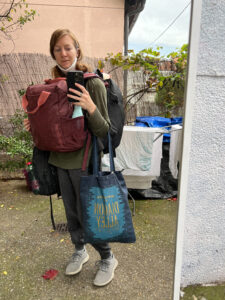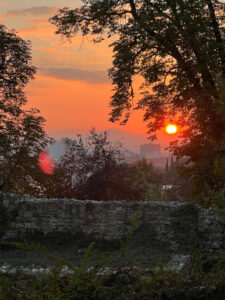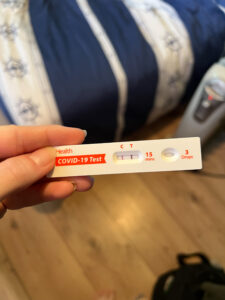
When I visited most of the Balkan countries in August, I intentionally skipped Croatia. Other than Greece and Turkey, Croatia probably gets the most tourists of any country in Southeast Europe, and I wanted to avoid the crowded high season. Two months later in late October, it was finally time to visit. Getting to Croatia meant waking up at 4:00am, taking a train from Romania one time zone backward to Budapest, and then catching a bus down to Zagreb, the capital of Croatia. Our bus stopped at the border which was totally empty. There was no one that we could see working at the patrol window to check our passports, and there were no other cars passing through. When I thought of Croatia, I imagined the mobs of tourists I’d seen in pictures of Dubrovnik, so it was strange to arrive via the emptiest border crossing I’d ever seen. We lingered outside the bus for at least an hour taking turns using the questionable tented port-a-potty and chatting with each other. I met a guy from the U.S. named Tom who was my age and also traveling alone. When we finally got to Zagreb, the two of us tentatively planned to meet the next day to do a free walking tour of the city that we’d found online. We parted ways to go to our separate hostels with me secretly suspecting I’d never see him again.
Zagreb is the Capital and largest city in Croatia, but it only gets a fraction of the tourism that Dubrovnik and the Dalmatian Coast receive. And I understand why. When people picture Croatia, I suspect they picture stunning coastlines, real-life Game of Thrones sites, fortresses, and sipping cocktails on nearly-private islands. Zagreb is not that. It’s nowhere near the coastline, and it’s 4 times larger than the next largest city in the country, Split. It felt more like the rest of the Balkans than any other place I visited in the country—the coast of Croatia feels more Mediterranean than Eastern European. Zagreb is far less expensive than the coast, a little grittier, quirky, and not trying very hard to impress you. I thought it was delightful.
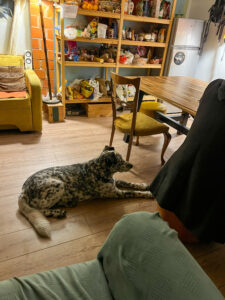


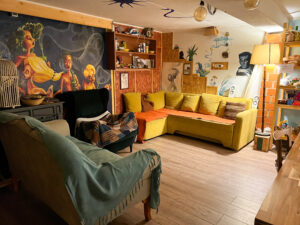
My hostel was a few miles outside of downtown in a residential neighborhood, so I had to take an Uber to get there. The driver let me out around the corner because the hostel was on a dead-end street nearly too small for cars, and I wandered up to a house with two dogs waiting for me inside the gate. It was unlike any hostel I’d stayed in before. It was a house that had been transformed into an eclectic hostel with an open-air kitchen in the back yard. It was a worn and cozy place full of mismatched furniture, hand-written notes and drawings pinned to the walls, and bookcases full of books in every language. Igor, the hostel owner, was such an interesting character. He seemed quite gruff and even intimidating at first, but as he checked me in, he said that he was going to upgrade me to a private room with a full-sized bed for no extra cost since the hostel wasn’t full. When I asked him if it was a safe area for me to walk and get dinner alone in the dark, he laughed at me. “Of course. It’s a lot safer than where you come from.”
I’d planned to sleep late the next morning after my 4:00am wake-up and exhausting day of travel to get to Zagreb, but I woke up early and exhausted instead. I have a hard time making myself sleep late in new places because there’s so much to explore, so I gave up on going back to sleep and took the tram downtown to the Farmer’s Market instead. Old Town Zagreb is made up of the Upper and Lower towns (the world’s shortest funicular will take you between the two, or a short walk up the hill). It’s full of restaurants and shops lining the pedestrian-only cobbled streets that are still lit by real gas lamps. The Zagreb Cathedral is there in Old Town, but sadly it was closed for visitors because it was still being repaired from earthquake damage. In March of 2020, an earthquake hit Zagreb, damaging a ton of historical structures in the city, as if the start of the pandemic wasn’t bad enough. It was the strongest earthquake to hit the area since the late 1800s, and they are still repairing a lot of structures today.
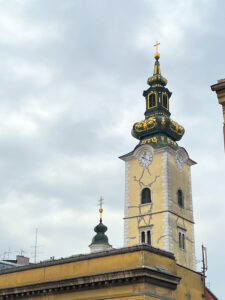

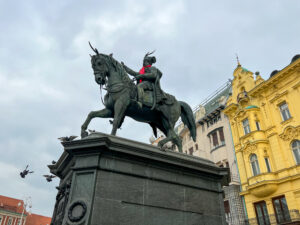
After grabbing a pastry at the farmer’s market, I walked to the meeting spot for the Free Walking tour, and Tom from the bus joined me there. On the tour, we learned all about the history of the Upper and Lower towns, how Old Town originated as two separate hilltop settlements, Kaptol and Gradec, about how the Balkan Wars affected Zagreb, and about how wonderfully bizarre Zagreb is. (Our guide told us that the spikes on the tops of the buildings were put there to protect against witches on their broomsticks. Really.) We visited the Lotrščak Tower so we could hear the canon fire, which happens every day at noon and terrifies passersby who don’t know why there’s a small crowd gathered at the bottom of the tower and staring at the upper window with fingers in their ears.
After the tour, Tom and I grabbed a snack and kept exploring. I am not a person who makes friends easily. I’m so introverted that I rarely desire the company of people I’m not already comfortable with, and I’m so socially uneasy that I feel awkward about reaching out to new people even if I do want company. A nice thing about solo travel is that it doesn’t always give you a choice in the matter. Sometimes an odd thing happens that never happens in real life where you find yourself with a new pal without realizing how it happened or having made a choice in the matter.
Tom looks like a person who lives in a beach hut and spends his days surfing with no cares in the world. But the little details of his life that he sprinkled into our conversation weren’t matching the image. Finally when he mentioned the podcast he had agreed to do a couple days later, I turned to him and said, “Okay, what am I missing? Are you secretly a famous person?” And he laughed but said, “I mean, I guess it depends on what you consider famous?” Which is not a no. He went on to say, no, he’s not really famous, but when I asked if anyone had ever recognized him in public, he admitted that they had. Turns out he’s an absurdly successful entrepreneur. But a really refreshing thing is that, despite what I assume are wildly different financial situations in our bank accounts, our travel styles were very similar, and we laughed about how all the people we met in hostels in their young 20s thought we were living in luxury when we were willing to spend $25 for a private room instead of $17 for a shared bunk. It’s always nice when people can surprise you.
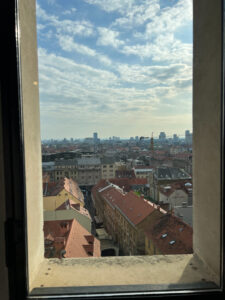
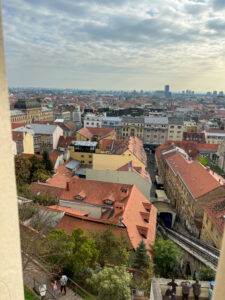

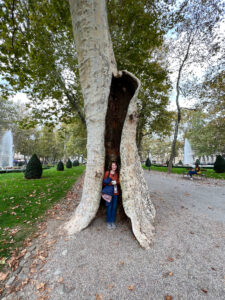
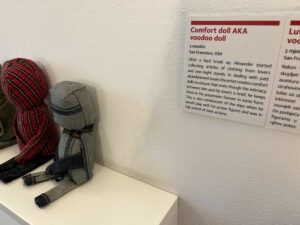
We wandered through the war tunnels in Old Town, which were built in 1943 to shelter civilians from air raids. Then we headed again to the Lotrščak Tower, this time to climb for the city view at the top. I didn’t tell Tom until we arrived that I was scared of heights. I made it up to the top, quivering like a lunatic as Tom laughed at me, then darted back down feeling very accomplished. I convinced him that we needed to see the Museum of Broken Relationships, which ended up being one of my favorite things I saw in Zagreb. It’s a museum full of items that people have donated to represent their broken relationships. Most of the relationships were romantic ones, but some were relationships with friends and family. Each item had a story explaining the end of the relationship and what the item represented, and they ranged from hilarious to heartbreaking (a stiletto from an encounter with a prostitute, a letter that a 13-year-old wrote to his first crush before the war broke out in Sarajevo, a nonfiction book titled I Can Make You Thin given as a gift by a (thankfully) ex-fiancé). A museum has never made me laugh harder or feel more sentimental.
We ended our day of wandering by eating an obscene amount of baklava from a place where no one spoke English, but the language barrier was not the reason that we ended up with enough baklava for half a dozen people. I headed back to my hostel, exhausted and half-delirious from what I assumed was way too little sleep. Tom and I planned to take a bus the next day to visit the famous Plitvice Lakes, one of the things I was most excited to see in all of Croatia. But I woke up in the middle of the night from crazy dreams and unable to breathe through my nose. By morning, I knew I had fever, and I texted Tom to let him know he’d have to go to the lakes without me. And once I finally worked up the nerve to face the truth, I took one of the half-dozen Covid tests I’d brought with me (hypochondria makes a person neurotic but also well-prepared), and the second line telling me it was positive popped up immediately.

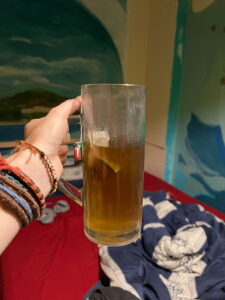
I’d never had Covid before. As the world’s biggest hypochondriac, I’d been obsessive about covid caution for the first year of the pandemic, and then once vaccines were finally available, my mom got her cancer diagnosis. Instead of relaxing like most people I knew did, I became even more vigilant. I’d existed largely as a hermit for the 2 years before starting my trip. And I knew that traveling would mean that it was likely I’d get sick at some point. As terrified as I was of covid (or more specifically of long-covid), I knew I couldn’t put my dreams on hold any longer. But I’d been cautious even as I traveled. I wore an N-95 mask in nearly all public indoor spaces, and (with the exception of the group tour in Turkey) the only times I took it off around other people indoors were if I were eating inside or in shared rooms where I was sleeping. I used an astonishing amount of hand sanitizer. And somehow, I’d made it a full 3 months traveling and sleeping in shared rooms without getting even a cold. I couldn’t be surprised that my luck had run out.
I was glad to be in a hostel where I could get help if I needed it instead of totally alone in an Airbnb where my paranoia would run wild. But I was horrified at the thought of infecting anyone else. I ventured out of my room only to go to the bathroom in the hall, and I wore an N-95 mask to do it. Then I had to figure out how to get food. I left the hostel once to get food and medicine at the pharmacy, but I was so exhausted and shaky when I got back that I knew it was a mistake. For the rest of my meals, I found a food delivery service similar to Uber eats online and ordered all my meals, sneaking out of my room at odd hours and late at night to store my leftovers in the fridge so that I was never around others. When Igor, the hostel owner, invited me to join the group to get BBQ on the second night, I told him I was sick, and he texted to check on me and make sure I had food for the rest of the week.
“No need to wear the mask,” he said when he saw me lurking around one evening. “Sickness happens to everyone when traveling!” He made me a giant mug of mint tea, and I wanted to weep about how kind it was and how it was just 3 days before that I’d found him to be abrasive and intimidating. I kept wearing the mask.
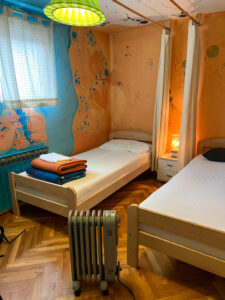
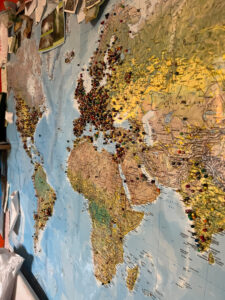
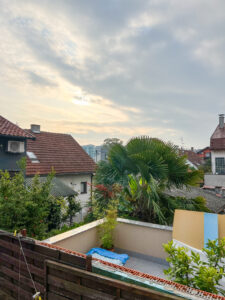
My original reservation was for 4 nights, but it was clear that I wasn’t going to be well enough to travel by then. Igor arranged for me to move into a different private room since my original room was already booked for the night I’d planned to leave. I spent 5 days there in that hostel either laying in bed, sitting on the floor, watching The Handmaid’s Tale on my computer, listening to Taylor Swift’s new album (how thoughtful of her to release it during my covid hibernation), or trying to read. Once my head felt clear enough, I tried to keep writing. Luckily I never got horribly sick—I had a fever for the first few days (of course I brought a thermometer with me) and an awful headache and sinus pressure, but after that, it was mostly congestion and exhaustion. With no structure to my time, those days slipped away.
Even at the time, I was thankful that it happened in Zagreb if it had to happen at all because I had the most wiggle room in Croatia. It would have been so much worse if it had happened in Western Europe where staying in a private room for a night would have cost me a week’s budget or when Michael was visiting or during the group tour in Turkey. I was lucky that Igor had upgraded me to a private room when I got there so that I didn’t unknowingly infect anyone else. (Thankfully Tom never got sick.) And finally after 6 nights in the hostel, I checked out, paid a very discounted price that I think Igor just made up for me, and left feeling like my luggage weighed twice as much as I remembered it weighing. My fever had been gone for several days, and I refused to miss one more second of my trip. Of course, things didn’t end up going exactly how I hoped for them to.
